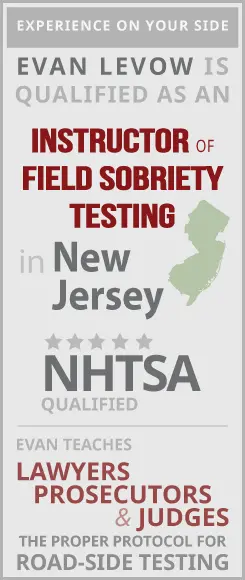DWI cases can be won, suspensions can be reduced, and even mandatory jail may not be mandatory if your lawyer knows DWI law.
How Does the State of New Jersey Prove That I Was Driving While Intoxicated?
The State bears the “burden of proof” in all cases involving violations of New Jersey law. Using the testimony of the officers and other witnesses in your case, the prosecutor will try to prove you guilty of DWI using the results of breath, blood and urine tests, and by your overall physical presentation, including how you drove the car, how you interacted with the police officer, and how you did on the field sobriety “tests”.
New Jersey’s drunk driving statute defines two distinct violations:
- being “under the influence” while operating a vehicle (conviction based on the roadside physical testing, your demeanor through the end of the encounter with the office);
- driving with a blood alcohol concentration (BAC) of 0.08% or more (per se violation)
If a prosecuting attorney can convince the judge that you were guilty of either violation, beyond a reasonable doubt, you will be convicted of a DWI.
Per Se Violations
“Per se” violations are based solely on the test results of your breath, blood or urine. If those testing results are at or above the legal limit of 0.08%, the State will try to use those result to obtain a conviction for DWI. This is known as a per se offense, and it satisfies the second prong of the violation mentioned above.
If you were
- operating a motor vehicle in New Jersey
- lawfully stopped, and
- properly arrested
And if
- you submitted to a breath test, blood test or urine test,
- the testing results are 0.08% or above, and
- if the results are admitted into evidence, and
- if you have no defenses to the testing results
Only then can you be convicted of DWI.
However….
- No test is 100% accurate
- Machines fail
- Police officers are human and make mistakes.
- There are many ways to successfully challenge breath, blood, urine or drug testing.
- If your lawyer can get the testing results suppressed or kept out of the evidence against you…
You CAN SUCCESSFULLY DEFEND a “per se” DWI.
If the testing results are precluded from the evidence, the State will still try to prove the DWI charge against you with the “physical” evidence, to prove that you were “impaired” or “under the influence” of alcohol or drugs.
Proving Impairment
If there are no breath, blood or urine testing results in your case, the State will try to obtain the DWI conviction based on “the physicals”. This is generally known as an “observation case”, and will include
- how you drove your car, considering whether you
- Forgot to turn on your lights or show any behavior consistent with being impaired
- Couldn’t maintain a proper lane of travel
- Committed any motor vehicle violation
- how you interacted with the officer at the arrest location or back at the police station
- Slurred speech
- Ability to stand, walk and balance
- Ability to follow directions and respond with appropriate answers and behavior
In order to prove that your driving was “deleteriously” affected by alcohol or drugs, the State will rely on the observations and opinion of your arresting officer and anyone else associated with your arrest, including other officers who saw you at the arrest scene or at the police station, and anyone that assessed you medically, like an EMT or hospital personnel.
These “observation” cases include any field sobriety exercises you performed on the roadside: one leg stand, walk and turn, or any other balance tests.
There are many ways to defend an observation case, by challenging how the roadside exercises were administered and whether there is any physiological reason why you couldn’t balance to the officer’s subjective satisfaction.
Types of DWI Testing
The expert DWI attorneys at Levow DWI Law, P.C. have provided a number of resources on the various forms of sobriety testing used in New Jersey.
Follow the links below to learn more about the tests the State will try to use against you. You’ll find need-to-know information on common testing errors, proven defense strategies and how our lawyers can help fight your charge.
Field Sobriety Testing
The National Highway Traffic Safety Administration (NHTSA) has validated three field exercises to determine whether “probable cause” exists for an arrest: the walk-and-turn, one-leg-stand, and horizontal gaze nystagmus (HGN). The walk and turn exercise, according to NHTSA, is 68% reliable in predicting someone to be over the 0.08% limit. The one-leg stand is only 65% reliable. HGN is not even admissible in New Jersey courts, because it has not been held to be scientifically reliable, as there are 40 causes of nystagmus or involuntary spasm in the eye, in addition to intoxication.
NHTSA has specifically stated that the field sobriety tests should be used for assessing probable cause to arrest, but “confirmatory” chemical testing is required to establish intoxication beyond a reasonable doubt.
The attorneys at Levow DWI Law, P.C. have received the same field test training that New Jersey’s officers receive. In fact, Evan Levow is a Qualified Instructor in the testing. We know the tests as well as, if not better than, your arresting police officer. We know how to assess the testing and effectively challenge the results as described by the arresting officer. Recognizing our expertise in DWI defense, other lawyers call us to consult on these issues. Levow DWI Law, P.C. can help you, too.
Learn more about standard field exercises and common police mistakes here.
Breath Testing
Breath tests are the standard “chemical test” used by New Jersey police to determine your blood alcohol content or BAC.
The State’s current machine, the Alcotest 7110 MKIII-C™, is subject to numerous inaccuracies. In fact, Evan Levow recently challenged the Alcotest’s reliability before the New Jersey Supreme Court.
In the biggest, most important DWI case in New Jersey history, State v. Chun, Evan forced the State and the Alcotest manufacturer, Draeger, to release the Alcotest’s computer software to determine whether the machine accurately reports results. After Evan’s work in State v. Chun, many defenses were established to challenge the results of the machine. Those charged with DWI can successfully challenge the accuracy of the machine results.
Here’s the bottom line: breath tests over the legal limit do not always result in a conviction for DWI. In fact, the lawyers at Levow DWI Law, P.C. have great success in suppressing breath test results.
Find more information on challenging the results of a breath test here.
Blood Testing
Nearly every expert will tell you that blood testing is by far the most reliable form of chemical test. But New Jersey considers it a last resort. And unlike most states, there are no regulations that say who should draw the blood or how they have to do it. With that being said, there is a right way to handle blood and a wrong way. If mistakes were made with your test, either at the hospital, on its way to the lab, or in the lab testing, the results should be challenged aggressively.
In two blood cases, Evan M. Levow disputed the reliability of blood testing, and his work actually changed New Jersey’s DWI prosecution protocol. The State is now required to produce live testimony, verifying that your blood was drawn, handled and tested in an appropriate manner. Lawyers, police officers, and judges have sought Mr. Levow’s advice on these issues.
Learn more about the many errors that can invalidate a blood test here.
Urine Testing
More than any other chemical test, urine tests are incredibly unreliable. Urine testing in New Jersey almost always involves an allegation that the person is under the influence of illegal or controlled substances, rather than alcohol. Positive test results can be successfully challenged and suppressed from the evidence in your case.
Our attorneys have trained extensively in the proper administration and protocols associated with urine testing. Evan Levow frequently lectures to other attorneys, judges and police officers on drug screening and the Drug Recognition Evaluation (DRE) program throughout New Jersey and across the country.
Find more information on challenging results here.
Contact New Jersey’s DWI Defense Experts
Facing a charge in New Jersey? You don’t have to plead guilty. You can fight the charges against you and win.
Contact the defense lawyers at Levow DWI Law, P.C. for a free consultation. We will review your case and will give you invaluable guidance on your best course of action for defending a New Jersey DWI. We offer payment plans.


